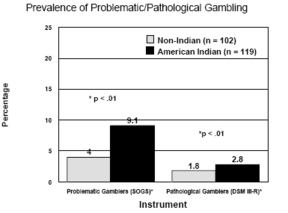A recent study tested the hypothesis that American Indian adults evidence higher rates of problematic and compulsive gambling behaviors than non-Indian adult populations. This study was conducted in a rural Northern Plains reservation and neighboring non-Indian communities. Zitzow found that a significantly greater percentage of American Indian respondents qualified for problematic and pathological gambling status than non-Indians. Rates for American Indians were nearly twice as high as for non-Indians using either of two instruments (SOGS & DSM-III-R). The author discussed several conditions that can place American Indian reservation adults at greater risk for problematic or compulsive gambling behaviors, including (1) lower socioeconomic status, (2) greater unemployment & lack of financial resources, (3) evidence of increased depression, and (4) limited social/recreational options on reservations. However, the results of this study might have been biased by characteristics of the different populations; the American Indians within this study were less educated, had lower household income, and more frequent histories of alcohol and marijuana use than their non-Indian counterparts. Since these factors have been associated with pathological gambling, the results could overestimate the gambling risk for American Indians. Further research is necessary to clarify and elaborate on gambling behaviors among American Indian populations.
Source: Adapted from Zitzow, D. (1996). A comparative study of problematic gambling behaviors between American Indian and non-Indian adults in a Northern Plains re servation. American Indian & Alaskan Native Mental Health Research, 7(2), 27-41.
This public education project is funded, in part, by The Andrews Foundation and the Massachusetts Department of Public Health.
This fax may be copied without permission. Please cite The WAGER as the source.
For more information contact the Massachusetts Council on Compulsive Gambling,
190 High Street, Suite 6, Boston, MA 02110.





